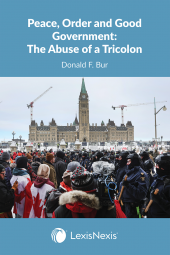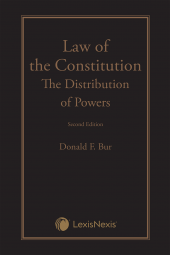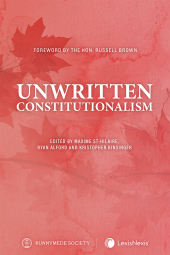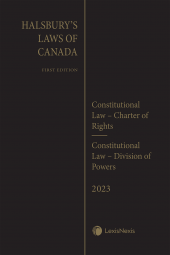Peace, Order and Good Government: The Abuse of a Tricolon
One Year Subscription Only Terms
Subscribers receive the product(s) listed on the Order Form and any Updates made available during the annual subscription period. Shipping and handling fees are not included in the annual price.
Subscribers are advised of the number of Updates that were made to the particular publication the prior year. The number of Updates may vary due to developments in the law and other publishing issues, but subscribers may use this as a rough estimate of future shipments. Subscribers may call Customer Support at 800-833-9844 for additional information.
Subscribers may cancel this subscription by: calling Customer Support at 800-833-9844; emailing customer.support@lexisnexis.com; or returning the invoice marked 'CANCEL'.
If subscribers cancel within 30 days after the product is ordered or received and return the product at their expense, then they will receive a full credit of the price for the annual subscription.
If subscribers cancel between 31 and 60 days after the invoice date and return the product at their expense, then they will receive a 5/6th credit of the price for the annual subscription. No credit will be given for cancellations more than 60 days after the invoice date. To receive any credit, subscriber must return all product(s) shipped during the year at their expense within the applicable cancellation period listed above.
Product description
The proposition that “[t]here are three branches of federal legislative power stemming from peace, order and good government: the gap (residual) branch, the emergency branch, and the national concern branch”, has been rarely questioned.
In Peace, Order and Good Government: The Abuse of a Tricolon, author Donald Bur undertakes to question this by examining the words “Peace, Order and Good Government” found in the introduction to section 91 of the Constitution Act, 1867.
Features of This Book
Bur examines the origins of Peace, Order and Good Government (POGG) in North America, and across multiple international jurisdictions, and applies it to the issues of the carbon tax, the COVID-19 pandemic, and the “freedom convoy” blockades.
The author posits an interpretation of “Peace, Order and Good Government” that is consistent with its use historically and internationally, and shows how these words have been mistakenly interpreted by the courts so that the federal Parliament uses Peace, Order and Good Government to give itself “emergency powers”, a residual power and “national dimensions power” to legislate in relation to provincial matters that is inconsistent with the exhaustive distribution of powers.
Who Should Read This Book
- Constitutional lawyers who require a reference for constitutional litigation on POGG, including decisions involving the carbon tax, COVID-19 pandemic and freedom convoy blockades
- Canadian judges and adjudicators who rely on a valuable reference for assistance in applying the doctrines of constitutional law when rendering decisions
- Law students and professors who need a reference for academic papers on POGG and to understand the origins and application of POGG
Table of contents
Introduction
Chapter 1: Assault on Federalism
§ 1.01 The Federalist Structure
§ 1.02 Assaults on Classes and Matters
§ 1.03 Introductory Clause Is Residual
Chapter 2: Origins of Peace, Order and Good Government
§ 2.01 Legislative Context
§ 2.02 Conceptual Origins
§ 2.03 Historical Origins of the Tricolon
Chapter 3: POGG as Part of Federalism
§ 3.01 Federalism
§ 3.02 Background Cases
§ 3.03 National Dimensions
§ 3.04 Emergency
§ 3.05 Provincial Dimensions
§ 3.06 Provincial Emergency Power
Chapter 4: How a Phrase Became a Power—and Left Federalism
§ 4.01 Emergency
§ 4.02 National Dimensions
§ 4.03 Conclusion
Chapter 5: Carbon Taxation
§ 5.01 Is Climate Change an Emergency?
§ 5.02 The Politics Behind the Reference Decisions
§ 5.03 Pith and Substance and Legislative Matter
§ 5.04 The “National Dimensions” Tricolon – Territoriality Enshrined
§ 5.05 What Is the Matter, and Did the “Matter” Move?
§ 5.06 The Residual Power in “National Dimensions” Analysis
Chapter 6: Conclusion
§ 6.01 Characterization of Matter Before Classification
§ 6.02 What Is a Matter
§ 6.03 Environmental Regulation
Table of Cases
Table of Select Laws
Index
 Lexis Nexis
Lexis Nexis 


